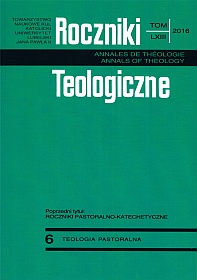The problem of making social policy coherent with the conciliar constitution Gaudium et Spes
Abstract
This text deals with the issue of making social policy coherent with the social message of the Second Vatican Council Pastoral Constitution Gaudium et Spes. It seems essential to examine the particular relationship between politics and religion in Poland. Politics, and in particular social policy is carried out by people who, in the main, belong to the two communities simultaneously: and religious ones. They are active politicians and also Christians. The problem of coherence between what they do in politics and what they confess because of their Christian identity arises here.
The author of the article investigates the issue, framed in this way. He does this by referring to the concept of politics practiced “in a Christian way”. For reasons of clarity, he accentuates the need to adopt an appropriate axiology and appropriate ethics. The right basis is needed for social policy, and this is integral anthropology, especially Christian personalism. According to the social message of Gaudium et Spes, social policy should take up its tools with the aim of “prudent care for the common good”. In practice, this means care primarily for the family. In Poland, due to the religious structure of the population, it is a task incumbent primarily on lay Catholics. They, in turn, expect appropriate formation of conscience on the part of the hierarchical Church.
In practicing “Christian” social policy, one has to be realistic, in order not to get entangled in utopia. However, the postulate of realism does not exclude carrying out such a policy project. The idea is firmly rooted in the abilities of man, and man finds in the Church exceptional strength and creative potential, which make rational care for the common good and its development possible. The Second Vatican Council pointed out how to go in this very direction.
References
Auleytner J., Polityka społeczna czyli ujarzmienie chaosu socjalnego, Warszawa: Wydawnictwo Wyższej Szkoły Pedagogicznej TWP 2002.
Conferenza Episcopale Italiana, Evangelizzazione e testimonianza della carità (8.12.1990), http://www.centrovocazioni.diocesitv.it/treviso/allegati/6831/Evangelizzazione.e.testimonianza.della.carita’.pdf
Dyczewski L., Rola rodziny i państwa w zapewnieniu bezpieczeństwa społecznego, w: tenże (red.), Małżeństwo i rodzina w nowoczesnym społeczeństwie, Lublin: Wydawnictwo KUL 2007, s. 211-239.
Firlit-Fesnak G., Rodziny polskie i polityka rodzinna; stan i kierunki przemian, w: G. Firlit-Fesnak, M. Szylko-Skoczny (red.), Polityka społeczna. Podręcznik akademicki, Warszawa: Wydawnictwo Naukowe PWN 2009, s. 185-199.
Kongregacja Nauki Wiary, Nota doktrynalna o niektórych aspektach działalności i postępowaniu katolików w życiu politycznym (24.11.2002), Poznań: Inicjatywa Wydawnicza „Jerozolima” 2003.
Kotowska I., Zmiany modelu rodziny. Polska – kraje europejskie, „Polityka Społeczna”, 2002, nr 4, s. 2-8.
Mazur J., «Ad bonum per politicam». Wybrane zagadnienia z etyki życia politycznego, Lublin: Wydawnictwo KUL 2011.
Sobór Watykański II, Konstytucja „Gaudium et spes”, w: Sobór Watykański II, Konstytucje. Dekrety. Deklaracje, Poznań: Pallottinum 2002, s. 526-606.
Sorge B., Wykłady z katolickiej nauki społecznej. Od Ewangelii do cywilizacji miłości, tłum. M. Zaręba, Kraków: Wydawnictwo WAM 2001.
Szarfenberg R., Definicje, zakres i konteksty polityki społecznej, w: G. Firlit-Fesnak, M. Szylko-Skoczny (red.), Polityka społeczna. Podręcznik akademicki, Warszawa: Wydawnictwo Naukowe PWN 2009, s. 21-36.
Szarfenberg R., Krytyka i afirmacja polityki społecznej, Warszawa: Oficyna Wydawnicza ASPRA-JR 2006.
Copyright (c) 2016 Roczniki Teologiczne

This work is licensed under a Creative Commons Attribution-NonCommercial-NoDerivatives 4.0 International License.





